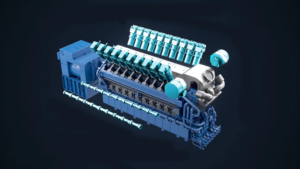
Bergen Engines
When Bergen Engine’s new owner, Langley Holdings plc, visited Bergen Engines at the end of last year, Chairman and CEO, Mr Anthony Langley gave the green light to a €4 million research project, to be funded jointly with the Norwegian government. The Ammonia Zero Emissions project (AMAZE) is developing the use of ammonia as an alternative fuel for ship’s engines.
AMAZE was launched by Bergen Engines in January 2022 to develop technology for a fuel-flexible internal combustion engine with carbon-free ammonia as the primary fuel. The development goal is a multi-fuel engine able to switch seamlessly from ammonia to diesel or other low-carbon fuels such as biofuels. Advanced fuel injection and combustion technology is expected to ensure high efficiency and close to zero emissions.
AMAZE is a three-year technology study led by Bergen Engines in collaboration with Equinor, SINTEF Energy Research, SINTEF Ocean, Norwegian University of Science and Technology (NTNU), and RISE Fire Research. The partners share the common goal to support the maritime industry in reaching climate neutrality, and will contribute with research and development in their respective areas of expertise. The €4 million project is being funded jointly between Bergen Engines, the Research Council of Norway and Equinor.
A zero-carbon solution accessible for the existing fleet
The AMAZE project is a response to the increasingly stringent emission requirements for the shipping industry. Fossil fuels have the highest energy density of all known fuels and are therefore also most used for shipping. Carbon-free hydrogen has the lowest energy density per unit volume and is challenging to use for deep-sea shipping as it is very space-intensive. Ammonia is a derivative of hydrogen. In liquid form, ammonia is a promising carbon-free fuel for deep-sea shipping, as it has a higher calorific value than hydrogen per volume basis, and it is therefore easier to store and handle..
“The AMAZE technology will allow shipowners to meet emission reduction targets in a cost-effective manner. Following the study, we aim to eventually develop a retrofit package that is economically viable and easy to install to ensure the continued use of existing equipment and mitigate the risk of stranded assets. Retrofitting opens the possibility to remove millions of tonnes of potential CO2 emissions from the existing fleet by switching to carbon-free fuels enabled by the AMAZE project”, says Therese Aalhus, Head of Engineering in Bergen Engines.
Engine lab-testing and experiments are done in close collaboration with NTNU and SINTEF, at their premises in Trondheim.
Revitalising the Compression Ignition (CI) technology to reduce emissions
“The AMAZE project aims to revitalise the conventional Bergen diesel engine, turning it into a high-pressure multi-fuel unit. The technology is expected to represent a breakthrough within ammonia operated internal combustion engines (ICE), as the engine will burn ammonia with compression ignition and direct high-pressure fuel injection. It will limit the amount of unburnt fuel being released into the atmosphere while preserving high thermal efficiency and ensuring fuel flexibility”, says Therese Aalhus.
Since carbon-intensive diesel is used to start the combustion with pilot injection, the project will investigate injection timings and strategies to minimise it, keeping the overall greenhouse gas emissions to a minimum.
Combustion of ammonia can result in nitrous oxide formation, which is a highly potent greenhouse gas. AMAZE will aim to mitigate such emissions directly in the combustion process.
Meet us at Nor-Shipping 4-7 April 2022
Visit our Bergen Engines booth B01-18 on 4-7 April at Nor-Shipping in Oslo and talk with our engine experts on how we can help enable zero carbon shipping.

The Ammonia Zero Emission (AMAZE) project was launched by Bergen Engines in January 2022 to develop technology for a fuel-flexible internal combustion engine that has carbon-free ammonia as the primary fuel.
About Bergen Engines AS
Bergen Engines produces medium speed liquid and gas fuelled engines and generator sets supplied to a broad range of land based, commercial marine and naval customers. The Bergen name is a watchword for quality and reliability in its field.
The tradition of engineering in Bergen, Norway, dates back to 1855 when the original company Bergen Mekaniske Verksted (BMV) was founded.
In 1946 the company built its first diesel engine and has since commissioned over 7,000 of its iconic liquid and gas fuelled engines. More than half of them are still in operation today, such is the quality and reliability of a Bergen engine.
From 1999, Bergen Engines AS was owned by Rolls-Royce plc. On 31st December 2021, the company was sold to the privately owned engineering and industrial group, Langley Holdings plc.
Bergen Engines will be at the core of Langley’s Power Solutions division, working closely with the Langley’s Italian Marelli Motori and German Piller Power Systems subsidiaries.
About Langley Holdings
Langley Holdings plc is a privately owned UK based engineering and industrial manufacturing group, principally producing capital equipment to diverse markets worldwide.
Langley businesses are either outright market leaders, or occupy strong niche positions in their respective fields, providing advanced technologies in a solutions-based approach. The group operates in three principal areas :
– Power Solutions
– Print Technologies
– Other Industrials
The group’s operations are based in Germany, Italy, France the UK and Norway, with 18 production facilities in Europe, the UK and the USA and a global manufacturing footprint of over 1,000,000 sq.m. (11,000,000 sq.ft.)
The group more has more than 90 sales and service subsidiaries worldwide and employs around 5,400 people. Revenues for 2022 are expected to be circa. €1.3 billion.
The group was established in 1975 by the current Chairman & CEO, Mr Anthony Langley and remains entirely in family ownership.
